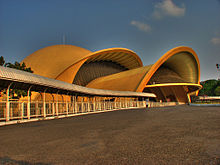
The Golden Snail (Keong Emas), established in 1970s during New Order era, is an IMAX theater located in Taman Mini Indonesia Indah, East Jakarta.
Betawi arts have a low profile in Jakarta and most Betawi have moved to the suburbs of Jakarta, displaced by new migrants. It is easier to find Java or Minang based wedding ceremonies rather than Betawi weddings in Jakarta. It is easier to find Javanese Gamelan instead of Gambang Kromong (a mixture between Betawi and Chinese music) or Tanjidor (a mixture between Betawi and Portuguese music) or Marawis (a mixture between Betawi and Yaman music). However, some festivals such as the Jalan Jaksa Festival or Kemang Festival include efforts to preserve Betawi arts by inviting artists to give performances.
There has been a Chinese community in Jakarta for many centuries. Officially, they make up 6% of the Jakartan population, although this number may be under-reported.
Jakarta has several performing art centers, such as the Taman Ismail Marzuki (TIM) art center in Cikini, Gedung Kesenian Jakarta near Pasar Baru, Balai Sarbini in Plaza Semanggi area, Bentara Budaya Jakarta in Palmerah area, Pasar Seni (Art Market) in Ancol, and traditional Indonesian art performances at the pavilions of some Provinces in Taman Mini Indonesia Indah. Traditional music is often found at high-class hotels, including Wayang and Gamelan performances. Javanese Wayang Orang performance can be found at Wayang Orang Bharata theater near Senen bus terminal. As the nation's largest city and capital, Jakarta has lured much national and regional talent who hope to find a greater audience and more opportunities for success.
Jakarta hosts several prestigious art and culture festivals, and exhibitions, such as the annual Jakarta International Film Festival (JiFFest), Jakarta International Java Jazz Festival, Jakarta Fashion Week, Jakarta Fashion & Food Festival (JFFF), Indonesia Creative Products and Jakarta Arts and Crafts exhibition. Flona Jakarta is a Flora and Fauna exhibition, held annually in August at Lapangan Banteng park featuring flowers, plant nurseries, and pets. The Jakarta Fair is held annually from mid June to mid July to celebrate the anniversary of the city and is largely centered around a trade fair. However this month-long fair also features entertainment, including arts and music performances by local bands and musicians.
Several foreign art and culture centers are also established in Jakarta, and mainly serve to promote culture and language through learning centers, libraries, and art galleries. Among these foreign art and cultural centers are Netherlands Erasmus Huis, UK British Council, France Centre Culturel Français, Germany Goethe-Institut, Japan Foundation, and The Jawaharlal Nehru Indian Cultural Center.
Museums
The museums in Jakarta cluster around the Central Jakarta Merdeka Square area, Jakarta Old Town, and Taman Mini Indonesia Indah.The Jakarta Old Town contains museums that are former institutional buildings of Colonial Batavia. Some of these museums are the Jakarta History Museum (former City Hall of Batavia), Wayang Museum (former Church of Batavia), the Fine Art and Ceramic Museum (former Court House of Justice of Batavia), the Maritime Museum (former Sunda Kelapa warehouse), Bank Indonesia Museum (former Javasche Bank), and Bank Mandiri Museum (former Nederlandsche Handels Maatschappij).
Several museums clustered in central Jakarta around the Merdeka Square area are National Museum of Indonesia (known as Gedung Gajah (the Elephant Building) due to there are being an elephant statue in front), Monas (National Monument), Istiqlal Islamic Museum in Istiqlal mosque, and Jakarta Cathedral Museum on second floor of Jakarta Cathedral. Also in central Jakarta area is the Taman Prasasti Museum (former cemetery of Batavia), and Textile Museum in Tanah Abang area.
The recreational area of Taman Mini Indonesia Indah in East Jakarta contains fourteen museums such as Indonesia Museum, Purna Bhakti Pertiwi Museum, Asmat Museum, Bayt al-Qur'an Islamic Museum, Pusaka (heirloom) Museum, and other science-based museum such as Research & Technology Information Centre, Komodo Indonesian Fauna Museum, Insect Museum, Petrol and Gas Museum, also Transportation Museum.
Other museums are Satria Mandala Military Museum, Museum Sumpah Pemuda, and Lubang Buaya.
Cuisine
Jakarta has a vast range of food available at hundreds of eating complexes located all over the city, frommodest street-side foodstalls and traveling vendors to the high-class expensive restaurants. The traditional Padang restaurants and low budget Javanese Warteg (Warung Tegal) foodstalls are ubiquitous in the capital. Next to a myriad of selection of Indonesian food and regional specialities from all over Indonesia, there is also international food, especially Chinese, Japanese, Korean, Thai, Indian, American, French, Middle Eastern, and modern fusion food. One of the most popular local dishes in Jakarta is Soto Betawi, which is a cow milk or coconut milk broth with beef tendons, intestines, tripe. The other popular foods are kerak telor, gado-gado, sate, and kue cucur.Media
Main article: Communications in Indonesia
Daily newspapers in Jakarta include- English language national newspaper: The Jakarta Post, The Jakarta Globe
- Indonesian language national newspaper: Kompas, Koran Tempo, Media Indonesia, Seputar Indonesia, Republika, Suara Pembaruan, Suara Karya, Sinar Harapan, Indo Pos, Jurnal Nasional, Harian Pelita
- Business newspaper: Bisnis Indonesia, Investor Daily, Kontan, Harian Neraca.
- Indonesian language local (Jakarta) newspaper: Pos Kota, Warta Kota, Koran Jakarta, Berita Kota,
- Sport newspaper: Top Skor
- Government television: TVRI.
- Private national television: MNC TV, RCTI, Metro TV, Indosiar, StarANTV, SCTV, Trans TV, TV ONE, Trans 7, and Global TV.
- Local television: Jak-TV, O-Channel, Elshinta TV, and Space-Toon.
- Cable television: First Media, TelkomVision
- Satellite television: Indovision, TelkomVision, Okevision, Aora TV, Yes TV


0 comments:
Post a Comment